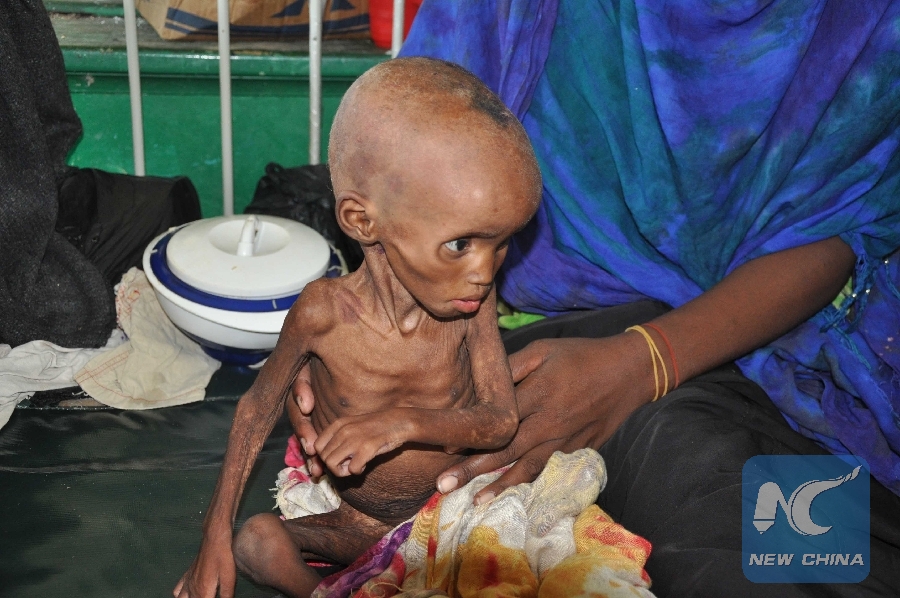
File Photo: A malnourished child is seen at the main Banadir Hospital in Somalia's capital Mogadishu, Aug. 22, 2011. (Xinhua/Faisal Isse)
UNITED NATIONS, Sept. 23 (Xinhua) -- The World Bank, the United Nations and partners on Sunday launched the Famine Action Mechanism (FAM), the first global initiative dedicated to preventing famine.
The mechanism, with the support of global technology companies, including Microsoft, Google and Amazon Web Services, seeks to change the status quo of delayed response and to move toward famine prevention, preparedness and early action, said the the organizers in a joint press release.
The initiative will use the predictive power of data to trigger funding through appropriate financing instruments, working closely with existing systems, they said.
Google, Microsoft and Amazon Web Services and other technology firms are providing the world's top expertise to develop a suite of analytical models called "Artemis" that use advanced artificial intelligence and machine learning to estimate and forecast worsening food security crises in real time. These forecasts will help guide and prompt decision-makers to respond earlier.
Famine is a fundamental moral issue, said World Bank President Jim Yong Kim at the launch event at UN Headquarters in New York. "The fact that tens of millions of people risk starving to death is a tragedy. And in the 21st century, the fact that we haven't ended famine is a collective failure of shameful proportions."
"Today we are taking a historic step to address these challenges and deliver our commitment to end the vicious cycle of panic and neglect when it comes to famine," he said.
"We have within our power to change that. There are challenges ahead of us. The commitment we are making is to find new and innovative ways to address them."
FAM will enhance the predictive power of the early warning systems, make financing predictable and strategic, and work with key partners to help ensure that resources are channelled to the most effective and well-coordinated interventions, said Kim.
However, early warning must translate into early action, he said. "Investment in more proactive responses to avert humanitarian crises could save millions of lives and also reduce the cost (of humanitarian interventions) to the international community by as much as 30 percent."
"We need to move away from ad hoc decision-making toward strategic coordinated planning across the humanitarian and development communities, and with governments, if possible," he added.
UN Secretary-General Antonio Guterres said FAM is an important new tool to help predict and prevent famine.
"FAM will give a more accurate picture of food security in real time, triggering early action from donors and humanitarian agencies that will save lives and prevent further suffering," he told the same forum.
With the cooperation of humanitarian development organizations, tech companies, academia, the insurance sector and others, this initiative is a successful multi-stakeholder partnership, he said.
Creating and strengthening partnerships will help donors, affected countries and international organizations to bridge funding gaps along the entire humanitarian cycle, from prevention and preparedness to emergency response, said the UN chief.
"With the Famine Action Mechanism, we are renewing our pledge to zero tolerance for famine and acute food insecurity. We are renewing our pledge to feed everyone in our world and to leave no one behind."
"This very basic goal should be within our grasp. With today's advanced technology and knowledge of agriculture, we can surely uphold everyone's fundamental right to food," he said.
After years of progress on hunger, the world is losing ground, he said. The number of undernourished people is rising to more than 820 million in 2017. "In our world of plenty, one person in every nine does not have enough to eat. Around 155 million children are chronically malnourished and may suffer the effects of stunting for their entire lives."
There are many reasons for this reversal, including spreading conflict, growing inequality and the impact of climate change. But without ending hunger everywhere, the international community cannot be satisfied with the progress on the 2030 Agenda for Sustainable Development anywhere, he said.
"In our interconnected world, peace, stability and prosperity on a healthy planet depend on leaving no one behind," he noted.
In 2017, more than 20 million people across northeastern Nigeria, Somalia, South Sudan and Yemen faced famine or famine-like conditions. These conditions continue in many parts of the world today, derailing hard-won development gains in chronically poor countries, according to the press release.
Today, 124 million people live in crisis levels of food insecurity, requiring urgent humanitarian assistance for their survival. Over half of them live in areas affected by conflict, it said.
During the spring meetings in 2017 between the World Bank and the International Monetary Fund (IMF), Kim and Guterres committed themselves to zero tolerance for famine. As a follow-up, the World Bank, the United Nations, the International Committee of the Red Cross and other global partners began to develop FAM.
FAM will initially be rolled out in a small group of vulnerable countries. Leaders dedicated to this initiative will gather as part of the IMF-World Bank annual meetings in October to discuss further implementation of FAM, said the press release.

